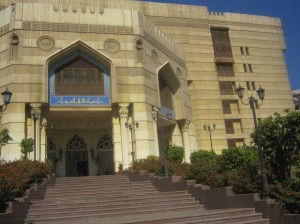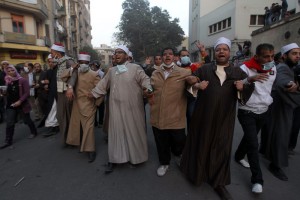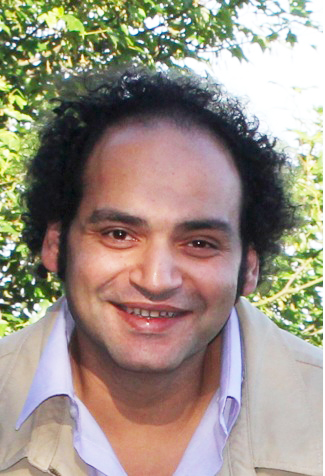Al-Azhar in history
In his book Muslims and Copts: In the Framework of the National Community, Tarek El-Bishry dedicated a fairly long chapter to the most prestigious religious institution of Sunni Islam in the world, Al-Azhar.
He described the institution’s early history and traced its evolution up until the 1952 coup d’état. El-Bishry highlighted a crucial point pertaining to that history; how Mohammed Ali Pasha’s family controlled religious institutions, particularly Al-Azhar and the military to be institutions supporting authoritarian rule.

Sarah El Masry
Mohammed Ali’s legacy produced rulers wanting to have strong ties with Al-Azhar sheikhs because of their respected status among the nation and the earned trust of the people.
These ties were further enhanced in Al-Azhar’s first Regulatory Law of 1910. Al-Azhar’s role was transformed from merely being an educational institution to a spiritual guide for the nation, and the head of the institution from being a director to being the Grand Imam of all Muslims.
Over time, the king consolidated power for himself to oversee religious institutions, appoint sheikhs, approve budgets and grant honorary titles. Successive governments and rulers attempted to reorganise the institutions of Al-Azhar and granted its Grand Imam more authority, centralising the religious institution’s governance and thus allowing easier control and manipulation by the state.
Another vital legal shift occurred when Egypt’s post-1952 regime drafted the Al-Azhar Regulatory Law of 1961 that brought the institution under the full control of the state. Al-Azhar’s religious endowments were transferred to the newly-nationalised Ministry of Religious Endowments (awqaf) compromising its fiscal independence.
Later, under Anwar Al-Sadat and Hosni Mubarak, Al-Azhar was co-opted and used to legitimise both regimes by issuing fatwas (a juristic ruling related to Shari’a). In the 1990s, it became the state’s instrument to discredit militant Islamists and respond to their theological premises. Additionally, it engaged in cultural and media censorship.
The 25 January Revolution put Al-Azhar’s role in society and politics in the spotlight. This scrutiny surged when the institution’s new role was spelled out in the constitution. How did Al-Azhar respond to the revolution and the events that followed? How did the revolution impact the millennium old institution, its sheikhs and students? Is the relationship between the current Islamist regime and Al-Azhar one of competition, confrontation or co-option? What does the future hold for Al-Azhar? These are all question that beg for answers.
After the revolution
It is safe to say that Al-Azhar with its structures, the Association of Senior Scholars, Al-Azhar Supreme Council, the Islamic Research Academy, the educational institutes sector and Al-Azhar University, became involved in different social and political matters.
Mahmoud Azab is a professor of Islamic civilisation at Sorbonne University in Paris and the Grand Imam’s advisor for dialogue affairs. He emphasises that the primary role of Al-Azhar is of an academic and scientific nature:
“However, the historical success of Al-Azhar enabled it to become the primary school of Egypt; it has been able to gain the trust of Egyptians, both Muslims and Christians, because of its moderation, or wassatiya,” he says.
Azab clarifies: “[Al-Azhar] has three roles: A national one because of its concern with the affairs of the nation (which is often confused or interpreted as a political role while it’s not; it is related to politics but it does not include formal political involvement), an Arabic and Islamic role because it has been trusted by the Arab countries and Islamic nations, and a global role where it represents the image of Egypt on the international scene.”
He says that in order to know how Al-Azhar has been transformed after the revolution, we need to admit that its role fluctuated with the periods of rise and fall of the Egyptian state. When the state was weak, all its institutions were affected including Al-Azhar. “But the periods of strength for Al-Azhar were more prevalent,” he accentuates.
Azab explains that since Ahmed Al-Tayeb was inaugurated as the Grand Imam in April 2010, he revamped the curricula taught at Al-Azhar higher education institutions that are crucial to the religious society in Egypt. Al-Tayeb established Bayt al-Aela al-Masirya, an institution that brings together sheikhs from Al-Azhar, prominent church clerics and civil servants to reform, discipline and refine religious speech from extremists and solve the issues related to sectarian strife before they occur.
“After the revolution Al-Azhar was the first institution to declare those who died in the uprisings as ‘martyrs’. Then it called upon and welcomed groups of all affiliations and prominent thinkers to hold dialogue after which the Al-Azhar document was drafted,” Azab adds.
In August 2011 most political factions, especially liberals and secularists, warmly received the document deeming it as democratic and progressive.

Mohamed Omar
“This was followed by another document declaring civil freedoms in January 2012 as well as the more recent document renouncing violence throughout Egypt. Currently Al-Azhar is working on issuing two more; on women and citizenship,” Azab continues.
Azab believes these documents exhibit the crucial role Al-Azhar plays in bringing together opposing forces in the political arena to solve the problems Egypt is facing.
Nevertheless Al-Azhar initiatives and documents did not have much impact on the ground. For example, the recent document on the condemnation of violence was criticised by revolutionaries as being detached from reality. After Al-Azhar met with party representatives and opposition leaders to sign the document, violence spilt once again on the streets surrounding the presidential palace. In a way, the recent document amplified the role of Al-Azhar, but it was still deemed futile by the youth.
Amr Ezzat, a researcher in freedom of religion and belief at the Egyptian Initiative for Personal Rights (EIPR), comments on one element that stood out in these documents.
“It was shocking to see everyone welcoming the documents Al-Azhar issued without much criticism. I’m referring here to the clause about Al-Azhar’s authority as the sole institution to interpret Shari’a. This clause was included from the very beginning and no one said anything. Later when it was added to the constitution, the fuss began,” says Ezzat.
He adds, “Only the Salafis disagreed with the content of some of the documents for their ideological differences with Al-Azhar.”
Ezzat thinks that “civil” parties did not heed the clause, allowing its legitimacy in order for Al-Azhar to act as an institution for solace, due to its wassatiya, and the protector from their Islamist rivals. “They [liberals and secularists] think of Al-Azhar as a defensive wall against the Muslim Brotherhood and Islamic fundamentalism, which is invalid,” he explains.
Powers under newly passed law and constitution
In January 2012 Al-Tayeb, with the blessings of the Supreme Council of the Armed Forces, amended the 1961 law that put Al-Azhar under control of the state, made it part of the presidential institution and allowed the president to appoint the Grand Imam.
Azab comments on the amendments saying they would grant Al-Azhar greater autonomy from any political authority.
The amended law stipulated the return of the Association of Senior Scholars granting them the responsibility for electing a new Grand Imam, nominating the Grand Mufti and designating a separate budget.
Ezzat is critical of the amendments, saying that the autonomy of Al-Azhar is really the autonomy of the elite of Al-Azhar sheikhs.
He says: “We do not see this independence materialising in Al-Azhar’s institutions such as its scholarly branch, the Islamic Research Academy.”
“The amended law orchestrated by the Grand Imam helped create a methodology to protect traditional identity of the old elite from penetration by the Brotherhood and Salafis,” Ezzat says.
The methodology enables the Association of Senior Scholars to elect the Grand Imam and nominate the Grand Mufti of Dar El-Ifta (a separate institution from Al-Azhar).
The amendments mandate the current Grand Imam to choose the first association of senior scholars. “Thus when the senior scholars elect the upcoming Grand Imam or nominate the new Grand Mufti, the nominees would come from the ‘wassati and traditional’ camp, known to not have any affiliation with the Brotherhood or Salafis. The result is a closed circle, and this elite group will continue to shape the future identity of Al-Azhar.”
Azab, however, emphasises that the amendments were not politically charged; instead, he calls them attempts at reforming Al-Azhar and granting it more autonomy. “Al-Azhar is not a political party or a religious sect, and it is not part of any political equation. It does not have any political gain to pursue.”
While Al-Azhar might not be considered a significant political organisation, the institution’s religious authority is guaranteed by Article 4 of the new constitution.
Under Article 4 Al-Azhar is designated as the sole institution with authority over Islamic religious matters. This article stirred controversy among civil, liberal and secularist opposition groups and human rights organisations as it poses a potential threat to civil liberties.

AFP Photo / Khaled Desouki
Ibrahim El Houdaiby, a former member of the Muslim Brotherhood, is a democratisation and Islamic movement researcher. In his article The Identity of Al-Azhar and Its Doctrine, he criticised Article 4 of the constitution as it expanded the authorities of Al-Azhar.
“Assigning an institution with the task of interpreting Shari’a is unusual in Islam where, traditionally, knowledge was not seen to be associated with any specific institution or religious hierarchy, but to scholastic aptitude that the nation has accepted throughout its history.”
El Houdaiby’s article continues: “The institution of Al-Azhar became important because of its countless scholars who met these criteria… Al-Azhar, therefore, becoming distinguished as a doctrine, not an institution.”
Ezzat shares the same sentiments as El Houdaiby, but for different reasons, guided by his concerns for freedom of religion and belief. “Declaring Al-Azhar as the only reference and arming it with such authority is against the idea of a democracy where there should not be an authority higher than the one elected by the people,” he explains.
According to Ezzat, the idea of a “religious centre” becomes conflicting especially when this centre claims rights above other groups or institutions. Making an institution a centre would declare others outside it as extremists, while this might not be the case. Also the premise that this centre is wassati is an illusion because it assumes that Al-Azhar is not monolithic with individuals of diverse ideologies.
Ezzat criticises the Al-Azhar elite, saying: “If people [opposition forces] were dependent on the elite at the top of the Al-Azhar pyramid and their wassatiya, they would have to realise that the elite will change one day and others with a completely different mindset and ideology could emerge, transforming Al-Azhar from wassatiya to whatever ideology this new elite believes in.”
Challenges internally and externally
The observer of Al-Azhar, the government along with other political forces will inevitably witness a lot of push and pull.
Simply put, Al-Azhar is not a fan of Islamists because of Mubarak’s hostile legacy towards them. It was co-opted by the state under Mubarak and thus its sheikhs passed through screening to ensure they were not affiliated with the Brotherhood or Salafis. That’s why the Al-Azhar elite mostly belong to a wassati and traditionalist school of thought different from that of political Islam.
The ouster of Mubarak gave Al-Azhar an opportunity to declare its autonomy from the state, allowing it to play a much more significant role, while at the same time jeopardising the status of the elite who are now dealing with an Islamist regime.
While Al-Azhar might not differ much from the Brotherhood ideologically, it opposes the ideology of their allies, the Salafis. This challenges the relationship between the government and Al-Azhar.
Al-Azhar’s relationship with the Ministry of Religious Endowments is umbilical. The ministry does not fall under Al-Azhar’s authority; it is rather part of the executive branch of the government, currently headed by a Brotherhood-affiliated minister. Nevertheless, the ministry depends on Al-Azhar sheikhs to preach at mosques.
This divides the pie between the government and the Al-Azhar; the former retains control of the Ministry of Religious Endowments, while the latter enjoys new autonomy (fiscally and administratively) and constitutionally expanded authoritative powers.
This division also explains the recent election of the new Grand Mufti who belongs to the same camp as the Al-Azhar elite.
Political analysts and observers widely propagate that this division is related to a fear of the Brotherhood and the Salafis infiltrating Al-Azhar institutions. However, both Al-Azhar and those critical of it, have different views about the rising tensions.
Azab says: “Al-Azhar is not infiltrated; everyone working at Al-Azhar knows its message and rules and those who stray from these are outliers and exceptions to the rule. Al-Azhar is a strong institution with significant influence, and after the revolution many weak elements have appeared in it. This is healthy so that we start reconstructing everything on stronger foundations.”
He confirms that Al-Azhar is not in confrontation with anyone because of its moderate message and discourse and belief in diversity.
Azab says “if there is a competition to bring about benefits and improvement of the Egyptian nation, then Al-Azhar welcomes it”.
“However,” he continues, “if the competition is propagating Islam then it must be known that this discourse is governed by principles and rules and the Islamic world has acknowledged Al-Azhar for that role.”
“This is not a monopoly it’s rather a process of accreditation because religion is something sensitive and dangerous; those who are not qualified should not preach with any lack of knowledge.”
Ezzat deconstructs some of the misconceptions regarding this push and pull theory. He explains that the ex-regime used Al-Azhar to demonise other religious movements (such as the Muslim Brotherhood and the Salafis) and ascribing to them fundamentalism and depicting Al-Azhar as a moderate representation of Islam.
“Part of this wassatiya reputation Al-Azhar possesses,” Ezzat explains, “was founded upon suppression and exclusion of the Islamists who are currently in power. We [human rights organisations] are against in principle even if we differed with the Islamists’ political ideology.”
“There are Salafis and Ikhwan and traditionalists inside the institution and you will find them at all levels of authority, depending on where you look; Al-Azhar University faculty members, students, among the Association of Senior Scholars and elsewhere. Al-Azhar is like Egypt; it has all shades of the religious spectrum,” he adds.
Ezzat’s analysis of the diverse composition of Al-Azhar is self-evident. We witnessed Mahmoud Shaaban, an Al-Azhar sheikh, but with a Salafi affiliation issuing a fatwa that calls for the assassination of opposition leaders. Meanwhile Al-Azhar University’s student body has increasingly become politicised as a result of the revolution; a number of student-organised fronts with liberal, Salafi, Brotherhood and traditionalist affiliations have sprung up as a result.
Amid the current political turbulence, Al-Azhar continues to play a great role in politics. Its religious authority has been legally determined. It is challenged internally by its own structure and need for reformation on multiple levels. It also faces external challenges; co-option by or possible confrontation with the regime and competition in religious influence from the Salafis. Nevertheless, the new Egypt and Al-Azhar will continue to mutually shape one another in the future.




